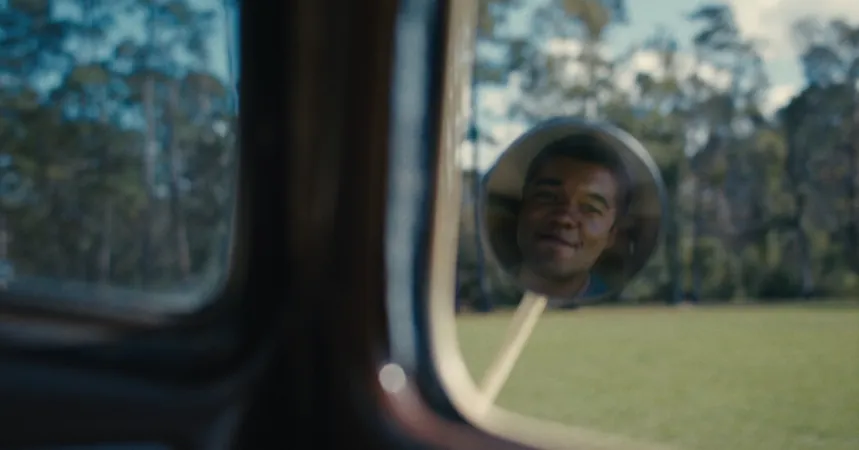
Time Travel in Black Cinema: How ‘Nickel Boys’ is Changing the Game
2025-01-15
Author: Ming
A New Era in Black Cinema
The cinematic landscape of Black storytelling is undergoing a radical transformation, led by the innovative film "Nickel Boys." Adapted from Colson Whitehead’s acclaimed Pulitzer Prize-winning novel, this powerful narrative dives deep into themes of injustice and resilience through a non-linear storytelling approach. Directed by RaMell Ross, the film chronicles the life of Elwood Curtis (played by Ethan Herisse), a bright-eyed Black youth wrongfully confined to the Nickel Academy, a Florida reform school notorious for its brutality. This institution echoes the harrowing history of the real-life Arthur G. Dozier School for Boys.
Innovative Storytelling
What sets "Nickel Boys" apart is its audacious structure. The film deftly utilizes first-person perspectives and intertwines archival footage, engagingly bridging the significant events of the 1960s Civil Rights Movement with contemporary realities. This narrative disruption speaks to a broader trend among modern Black filmmakers. Films like "A Thousand and One," "All Dirt Roads Taste of Salt," and "Time" reflect a momentous shift away from traditional chronological storytelling. These films encapsulate the profound impacts of both the COVID-19 pandemic and the Black Lives Matter movement, marking what many are calling a revolutionary era in Black cinema.
Fragmented Perceptions
One striking instance in "Nickel Boys" occurs during a cafeteria scene, where Ross deftly shifts perspectives—first through Elwood's eyes, then through his friend Turner. This technique reinforces a vital notion: our perceptions of Black experiences are often fragmented and in need of healing. Such exploration of perception and temporality is reminiscent of Ross’s earlier work in the documentary "Hale County This Morning, This Evening," which blurred narrative lines with its evocative and dynamic editing.
Temporal Complexity
Near the film's conclusion, Ross employs an eye-opening montage that depicts Elwood's life through reversed scenes, government ID images, and haunting photos of neglected Black lives from Nickel. This poignant layering provides a stark paradox, allowing viewers to experience both past and present traumas simultaneously. Such temporal complexity enriches the viewer’s understanding of Black existence, harkening back to the intrinsic rhythm of Black life—an essence that has historically nourished movements like jazz, the Harlem Renaissance, and the Black Arts Movement.
A Departure from Tradition
Unlike the linear narratives often found in earlier Black cinema, such as race films and blaxploitation, "Nickel Boys" embraces an untraditional storytelling form that pays homage to the legacy of cinematic pioneers. Ross’s approach echoes his 2019 essay in Film Quarterly, where he argues that “time becomes the new medium,” providing a canvas for reflecting on the long history of racial dynamics in America.
Resurgence of Non-linear Storytelling
While the bending of time is not an entirely novel concept within Black film—Afrofuturism and the work of the L.A. Rebellion filmmakers have long played with non-linear storytelling—it is receiving a vigorous resurgence today. Groundbreaking films from the likes of A.V. Rockwell, Raven Jackson, and Garrett Bradley have garnered significant attention and investment, allowing for richer explorations of Black life. Rockwell’s "A Thousand and One" intricately weaves the effects of gentrification in Harlem, while Jackson’s poetic "All Dirt Roads Taste of Salt" navigates the themes of memory and loss.
Reflections of Recent Events
The impact of recent events, particularly the pandemic and the racial justice protests following George Floyd's death, can be seen in this latest wave of Black cinematic artistry. These films reject the notion that progress can solely be measured by time elapsed, instead serving as captivating reflections on identity, trauma, and resilience.
Rethinking Storytelling
As a result, "Nickel Boys" and its contemporaries are not merely chronicling the past or present but are fundamentally rethinking the ways in which their stories can be told. They challenge the status quo, providing space for narratives to unfold at their own rhythm, fostering an exciting and transformative era for Black cinema.



 Brasil (PT)
Brasil (PT)
 Canada (EN)
Canada (EN)
 Chile (ES)
Chile (ES)
 Česko (CS)
Česko (CS)
 대한민국 (KO)
대한민국 (KO)
 España (ES)
España (ES)
 France (FR)
France (FR)
 Hong Kong (EN)
Hong Kong (EN)
 Italia (IT)
Italia (IT)
 日本 (JA)
日本 (JA)
 Magyarország (HU)
Magyarország (HU)
 Norge (NO)
Norge (NO)
 Polska (PL)
Polska (PL)
 Schweiz (DE)
Schweiz (DE)
 Singapore (EN)
Singapore (EN)
 Sverige (SV)
Sverige (SV)
 Suomi (FI)
Suomi (FI)
 Türkiye (TR)
Türkiye (TR)